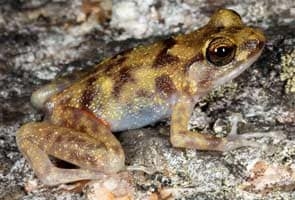
Scientists have found a ‘lost world’ during the first expedition to a remote Australian peninsula. A James Cook University National Geographic expedition to Cape York Peninsula in north-east Australia found three new vertebrate species- a bizarre looking leaf-tail gecko, a golden-coloured skink and a boulder-dwelling frog – unknown and isolated for millions of years.
Within several days they had discovered three highly distinct new vertebrate species as well as a host of other interesting species that may also be new to science.
“Finding three new, obviously distinct vertebrates would be surprising enough in somewhere poorly explored like New Guinea, let alone in Australia, a country we think we’ve explored pretty well,” said Hoskin.
The upland of Cape Melville is a thoroughly isolated rain-forest island in a ‘sea’ of hot, dry forest. The gecko, skink, frog and other rain-forest-associated inhabitants have been completely isolated up there for millions of years.
“These species are restricted to the upland rain-forest and boulder-fields of Cape Melville. They’ve been isolated there for millennia, evolving into distinct species in their unique rocky environment,” Hoskin said.
The three new species have been named, with descriptions appearing in the international journal Zootaxa.
The highlight was the discovery of the leaf-tailed gecko. Leaf-tail geckos are large (20 cm), ‘primitive-looking’ geckos that are Gondwanan relics from a time when rain-forest was more widespread in Australia.
The Cape Melville Leaf-tailed Gecko is highly distinct from all relatives and has been named Saltuarius eximius. The species name translates as ‘exceptional’, ‘extraordinary’ or ‘exquisite’, in reference to its unusual form.
“The second I saw the gecko I knew it was a new species. Everything about it was obviously distinct,” said Hoskin.
“The Cape Melville Leaf-tailed Gecko is the strangest new species to come across my desk in 26 years working as a professional herpetologist. I doubt that another new reptile of this size and distinctiveness will be found in a hurry, if ever again, in Australia,” said Hoskin.
“The top of Cape Melville is a lost world. Finding these new species up there is the discovery of a life time – I’m still amazed and buzzing from it,” said Hoskin.
Credit : Business Standard
Picture Credit : Google




